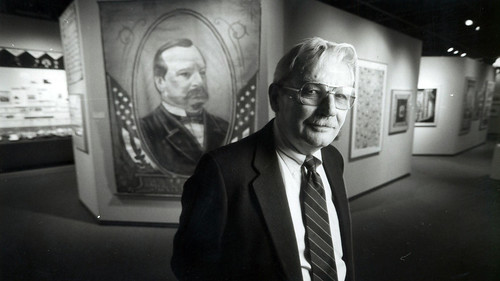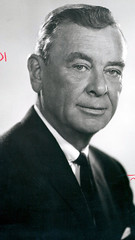
PREV ARTICLE
NEXT ARTICLE
FULL ISSUE
PREV FULL ISSUE
CONTROVERSY CLOUDS DEWITT POLITICAL COLLECTION FATE
Another prominent old-time collection is the J. Doyle deWitt collection of political medals, medalletes. ferrotypes and buttons. Dick
Johnson submitted this article about the current controversy over plans to disperse it. Thanks! -Editor
He built a collection of political campaign memorabilia, now worth $4 million. It was in the news this week raising a considerable controversy. Prior to his retirement he sought a permanent home for his collection, then numbering 50,000 items including nearly a thousand medals, The University of Hartford in his native city was adding a new museum to its campus in West Hartford. This was the ideal solution and the University accepted the donation of his collection. The museum devoted a large gallery in the museum’s lower level entirely to deWitt’s collection. It was mostly behind glass with banners hanging from the ceiling. A fulltime curator / director was named, Edmund B Sullivan, with a first floor office at the head of the stairway to the lower level. Meanwhile, deWitt wrote on his devoted subject, three books and several articles. In 1959 he self-published his major work, A Century of Campaign Buttons: 1789-1889. This was an extensive catalog of political medals, medalletes. ferrotypes and buttons, each type illustrated with specimens from his own collection. DeWitt was a customer of John J. Ford who had sold him many of these medals. DeWitt wanted to distribute to collectors the small quantity he had printed of his book. He asked Ford for a list of collectors he could send his book to. Ford knew of my interest in numismatic literature and added my name to the list. At the time, 1959, I was on the staff of a daily newspaper as classified ad manager. The book arrived for me at the office. I couldn’t put it down pouring over the excellent illustrations and brief descriptions. I didn’t get much work done for the rest of the day! Back at the museum, director Sullivan was busy arranging exhibits and conducting tours of the collection. Sullivan, had joined the University of Hartford in 1968, named director of the deWitt Collection a decade later. He wrote three books and articles based on the collection, the most noted was Collecting Political Americana, published in 1980. 
Edmund Sullivan at DeWitt Collection Exhibit Sullivan updated deWitt’s 1959 catalog with new varieties which had surfaced in the meantime. He changed the title from deWitt’s “Campaign Buttons” to a more accurate “Political Medals and Medallets,” both covering the period 1792-1889, of all U.S. presidents from Washington to Benjamin Harrison. Sullivan retained deWitt’s original catalog numbers without crediting him. It was published by Quarterman in 1991. As political item collectors know the celluloid pin was introduced in 1892, effectively ending widespread use of medals as campaign items. Both, however, are collected by members of the national organization, American Political Items Collectors, whose Connecticut chapter is named after J. Doyle deWitt. In July 1992 the American Medallic Sculpture Association sponsored a week-long workshop and conference at the Univ of Hartford campus in which I was involved. It allowed me an entire week to visit with Sullivan and examine the exhibits at length. Later the University fell on hard times and the exhibit was closed to the public in 2006 and Sullivan was dismissed. Shortly thereafter the collection was boxed and placed in storage with its future in limbo. Last month the University announced it wished to auction off the collection. This brought on complaints and a threatened law suit by a Hartford attorney and collector, Bruce Ruhbenstein. He had been a friend of DeWitt’s, had arranged an exhibit of his material with Sullivan and donated a large segment of his own political collection to the University. This week he threatened to sue the University preventing such disposal of the collections. What was the collection’s unknown fate a decade ago now faces an even greater unknown future.
Here's an excerpt from an April 28, 2016 Hartford Courant article about the collection. -Editor

A major donor to the University of Hartford's DeWitt collection of political memorabilia said he'll sue to block the school's plan to sell the collection, even as a former senior U.S. Senate aide expressed new doubt Thursday about whether such a sale would be legal. Hartford lawyer Bruce Rubenstein said that, in the early 1990s, a variety of senior officials at the school pressed him to donate his $1 million collection of left-leaning political materials so that they could be displayed as an addendum to an extraordinary collection of U.S. presidential items donated previously by J. Doyle DeWitt, former chairman of The Travelers Cos. Rubenstein said Thursday that he agreed to make the gift only after obtaining assurances from then-university President Humphrey Tonkin and others that his collection would remain intact and on display with the DeWitt materials in an on-campus museum, which would be part of a library funded in part by Congress to house the DeWitt collection. Rubenstein said his collection, a broad array of leftist material, effectively became a part of the DeWitt collection. "Naturally, I was very upset when I read that they were going to sell the DeWitt collection and my stuff and use it to fund university operations," Rubenstein said. "That was not my intent when I made the donation. The intent was to have the museum display it and have the public come in and learn from it. I felt like I was the victim of a fraud."
I've seen this movie before, and I know how it ends. I was one of many outraged Pittsburgh area numismatists when the Carnegie Museum
of Natural History announced it planned to sell its world-famous coin collection in the late 1970s. Although a settlement was reached
where the Museum kept intact the Clapp collection of U.S. Large Cents, a type set of U.S. coins, and all local tokens and medals, the
bulk of the collection was eventually sold in multiple sales across the globe. -Editor
To read the complete article, see:
THE BOOK BAZARREWayne Homren, Editor The Numismatic Bibliomania Society is a non-profit organization promoting numismatic literature. See our web site at coinbooks.org. To submit items for publication in The E-Sylum, write to the Editor at this address: whomren@gmail.com To subscribe go to: https://my.binhost.com/lists/listinfo/esylum All Rights Reserved. NBS Home Page Contact the NBS webmaster 
|
